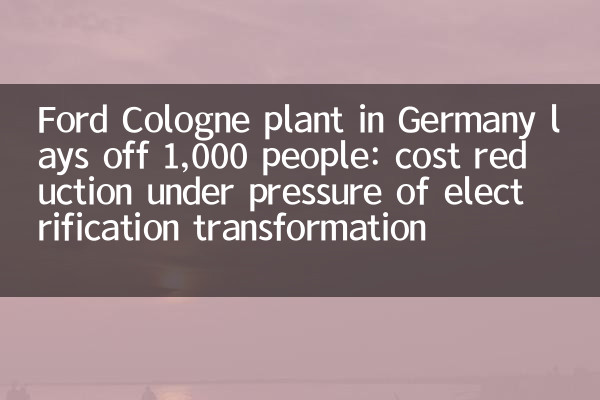Ford Cologne plant in Germany lays off 1,000 people: cost reduction under pressure of electrification transformation
Recently, the global automotive industry has accelerated its electrification transformation, and traditional car companies are facing tremendous pressure. Ford Motor announced that it will lay off about 1,000 employees at its Cologne plant in Germany to cope with cost pressures during the electrification transformation process. This move has attracted widespread attention and has become one of the hot topics in the past 10 days.
1. Event background

Ford Motor said the layoffs are part of the company's global restructuring plan, aiming to optimize operational efficiency and concentrate resources to promote the electrification strategy. The Cologne factory is Ford's important production base in Europe, mainly producing models such as Focus, and will be transformed into an electric vehicle manufacturing center in the future.
| project | data |
|---|---|
| Number of layoffs | About 1,000 people |
| Less than layoffs | 15% of the total number of employees in the Cologne plant |
| Plan completion time | Before the end of 2023 |
| Investment in electrification | 2 billion euros (for renovation of the Cologne factory) |
2. Industry trend analysis
Ford's layoffs are not an isolated case, and the global automotive industry is facing profound changes. The following are hot topics and data related to electrification transformation in the past 10 days:
| Car companies | dynamic | Range of impact |
|---|---|---|
| Volkswagen Group | Announced layoffs of 5,000 people | German headquarters |
| Benz | Delay electrification targets to 2030 | Global strategic adjustment |
| Tesla | The production of the German factory exceeded 5,000 vehicles | European market expansion |
| BYD | European market share exceeds 5% | Chinese brands rise |
3. Electrical transformation pressure
Traditional car companies face multiple challenges in the transformation of electrification:
1.High R&D cost: Electric vehicles have invested hugely in research and development of core components such as batteries and motors.
2.Supply chain reconstruction: The supply chain of traditional fuel vehicles and electric vehicles have significant differences, and they need to be re-arranged.
3.Fierce market competition: Emerging car companies such as Tesla have already gained a first-mover advantage in the electric vehicle field.
4.Policy pressure: The EU plans to ban the sale of fuel vehicles in 2035, forcing automakers to accelerate their transformation.
4. Ford's electrification strategy
Ford plans to launch seven new electric vehicles in Europe by 2026, and the Cologne factory will become an important fulcrum of this strategy. Here are the key data for Ford's electrification planning:
| project | Target |
|---|---|
| Electric vehicle sales share | Reaching 60% of European sales in 2026 |
| Total investment amount | USD 50 billion (global electrification investment) |
| Capacity planning | In 2026, the global annual production capacity of electric vehicles will be 2 million |
| Battery supply | Cooperate with suppliers such as CATL |
5. Industry impact and prospects
Ford's decision to lay off employees reflects the pain of traditional car companies during the transition period. In the short term, cost reduction and efficiency improvement will become the main strategies; in the long run, technological innovation and market positioning will determine the success or failure of car companies.
Experts predict that the next 3-5 years will be a critical period for the reshuffle of the automotive industry:
- The penetration rate of electric vehicles in the European market may exceed 30%
- Competition between traditional car companies and emerging car-making forces will intensify
- Battery technology and charging infrastructure become the key to winning
The layoffs at Ford Cologne plant are just a microcosm of industry changes. Under the global carbon neutrality goal, the electrification transformation of the automobile industry has become irreversible. How to balance short-term costs with long-term development will be a problem that all traditional car companies must face.

check the details

check the details